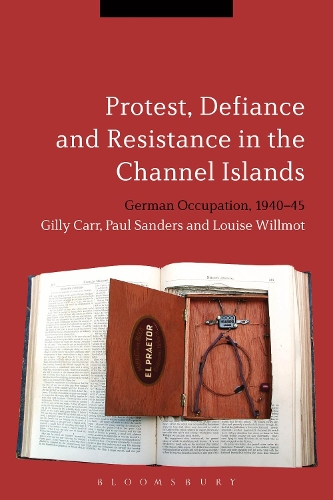
Protest, Defiance and Resistance in the Channel Islands: German Occupation, 1940-45
(Hardback)
Available Formats
Publishing Details
Protest, Defiance and Resistance in the Channel Islands: German Occupation, 1940-45
By (Author) Dr Gilly Carr
By (author) Professor Paul Sanders
By (author) Dr Louise Willmot
Bloomsbury Publishing PLC
Bloomsbury Academic
19th June 2014
United Kingdom
Classifications
General
Non Fiction
Modern warfare
European history
940.534234
Physical Properties
Hardback
392
Width 156mm, Height 234mm
726g
Description
The Nazi occupation of Europe of World War Two is acknowledged as a defining juncture and an important identity-building experience throughout contemporary Europe. Resistance is what saves' European societies from an otherwise chequered record of collaboration on the part of their economic, political, cultural and religious elites. Opposition took pride of place as a legitimizing device in the post-war order and has since become an indelible part of the collective consciousness. Yet there is one exception to this trend among previously occupied territories: the British Channel Islands. Collective identity construction in the islands still relies on the notion of orderly and correct relations' with the Germans, while talk of resistance' earns raised eyebrows. The general attitude to the many witnesses of conscience who existed in the islands remains ambiguous. This book conversely and expertly argues that there was in fact resistance against the Germans in the Channel Islands and is the first text to fully explore the complex relationship that existed between the Germans and the people of the only part of the British Isles to experience occupation.
Reviews
[This book] provide[s] a revealing picture of how a not very heroic people - probably like most of us - managed to cope with the difficult circumstances of a basically irresistible enemy occupation. * Literary Review *
The authors undertook a substantial quantity of research, and the book shines when it ... focus[es] on the context in which the occupation played out. * American Historical Review *
Protest, Defiance, and Resistance in the Channel Islands will undoubtedly appeal to academics with an interest in occupation history, Holocaust studies, and resistance studies, and would be a good choice for anyone with a particular interest in the history of the Channel Islands or Island studies in general [The book] does not simply fill in a gap in Channel Island or occupation historiography; it contributes to a more balanced and nuanced understanding of the multiple British experiences of the Second World War. * Journal of British Studies *
Author Bio
Gilly Carr is Senior Lecturer in Archaeology at the University of Cambridge, UK. Paul Sanders is Associate Professor at NEOMA Business School in Reims, France. Louise Willmot is Principal Lecturer in History at Manchester Metropolitan University, UK.
